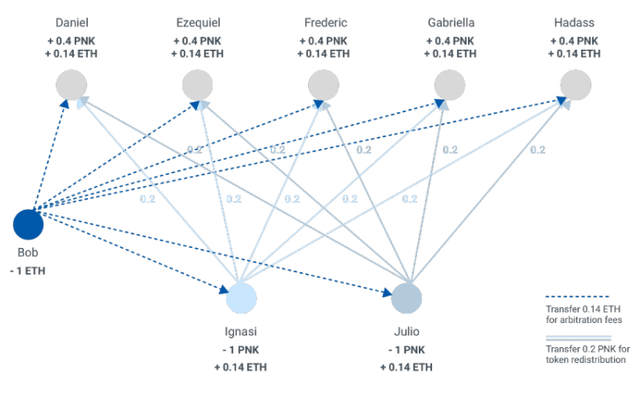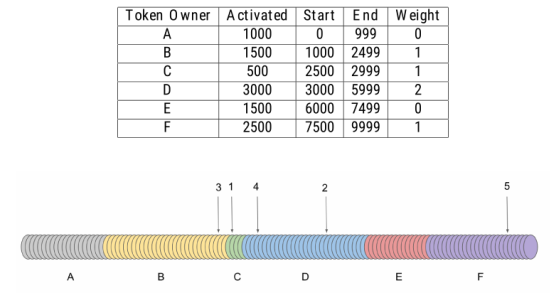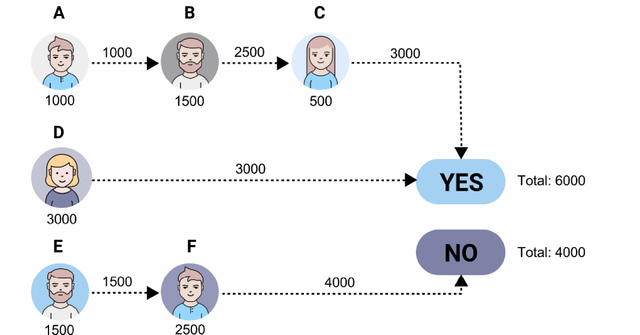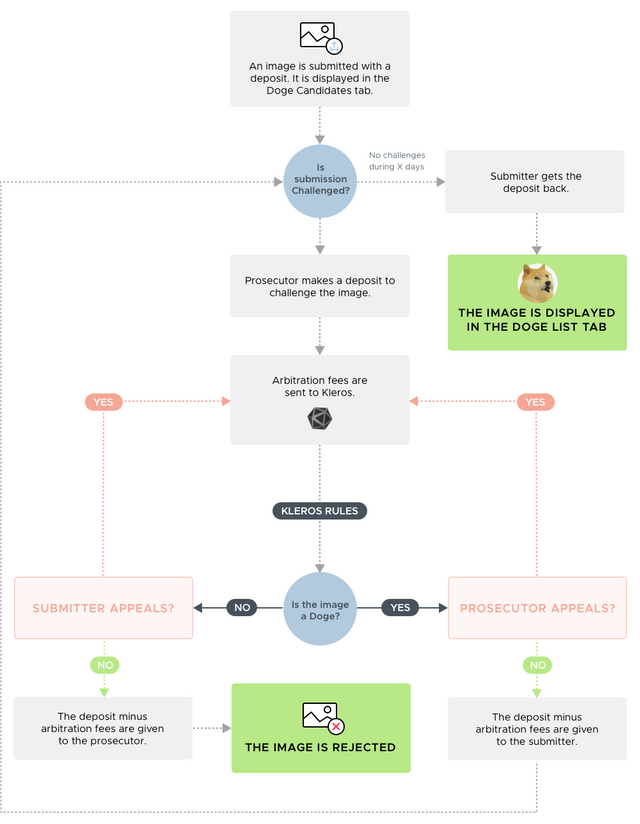Kleros: Affordable And Speedy Justice For The Common Man

Two years ago, a friend of my mum came into her boutique and wanted to buy a shoe on credit. Because of their friendship at the time, my mum agreed to give her the shoe with the verbal agreement that she(the friend) would pay the whole sum for it at the end of the month when she got her salary. The friend left with the shoe and mum didn't bother to remind her in order not to come across as "embarrassing". Come month end, the friend failed to show up and when mum called her, she claimed "some things had come up" and promised to pay the following month end. The month ended, a different excuse came with it, and with the next, and next till the debt was 8 months old. By this time their friendship had degenerated to resentment and hostility. My mother wanted to call in the police and even take the matter to court, but by the time she thought of the costs she would incur chasing damages for a shoe worth roughly $30, she was discouraged and finally counted the whole incident as a loss.
So what did I learn from this incident? Well, never mix pleasure or sentiment with business, but most importantly, ALWAYS HAVE A LEGALLY BINDING AGREEMENT.
Many people find themselves in situations where only a court ruling can help them but the gain of the proceedings is far too insignificant in relation to the expenses it would take to secure that court hearing and ruling.
Kleros is an Ethereum-based decision protocol platform designed to arbitrate across multiple courts. It features experienced jurors presiding over cases within their expertise bound by smart contracts.
Let's look at their introduction video.
Kleros utilizes crowd-sourcing and the blockchain to bring cheap and speedy judgments to cases, doing in days what conventional methods would take years and large expenses to accomplish.

How It Works
Kleros is built based on the "Schelling Point" - the concept that people tend to coordinate themselves even without communication (E.g., if you and your friends were going to the beach, and you all left from different locations, chances are you would all head to your favourite spot even without discussing it).
Kleros aims to monetize the application of the Shelling Point and use it as incentive to derive honesty.
This is accomplished by a majority vote. Take for example you called 10 people currently residing in Japan and asked if it was raining. 9 said yes, 1 said no. According to the Shelling Point, if 9 out of 10 people say it's raining in Japan right now, it's probably raining and the 10th person is lying.
Now what if the people asked the question had input stake to gain or lose, would the 10th person lie? The Shelling mechanism rewards the majority vote and causes the deviant vote to lose points.


Kleros Functionality
With Kleros, experts in different fields of life apply to be jurors in their specialized fields. They do this by depositing Pinakoin(PNK). The amount of Pinakoin staked helps increase the likelihood of selection.
On the other side, any two parties about to go into business(E.g. Client and Worker) can choose to setup a contract via Kleros. This contract would include all the terms of agreement between the parties and state that Kleros would be the arbitrator in the case of any dispute. The Kleros contract holds the funds of the trade until all set parameters are met. They also choose the type of court(typically a court experienced in the business matter) to preside over their case, the number of jurors desired and possible options of the jurors.
E.g.
A - \Refund client"
B - \Pay Worker"
C - \Allow more time for worker to meet agreed quality of service"
If all goes well, then the smart contract automatically pays the worker.
In the case of a dispute (E.g. worker fails to do work to the agreed quality, or client refuses to pay) the aggrieved party can easily invoke the Kleros contract with an email containing details of the agreement and evidence to back claim.
\send to Kleros
Jurors are randomly selected and assigned to the case. The jurors review all the evidence and make educated judgment within 3 days.
Both parties (client and worker) receive the notice of judgment and the smart contract automatically follows the delivered command.
If either party is not satisfied with the juror ruling, he/she can appeal the ruling and a higher number of jurors is assigned to review the case for final judgment (twice the first number of jurors +1)
User Case Scenario (Plaintiff and Defendant)
John is a painter hired by Fred to paint a 3-storey building Yellow. Both are in Ghana. John agrees to finish the job within 2 weeks and receive payment at the end of the job. Due to some bad experiences in the past, John suggests that a Kleros contract be used. Fred, the client agrees.
They specify that the case should be under a construction court and there should be 5 jurors.
John paints the building beautifully but when he shows up for his payment, Fred suddenly changes his mind and decides he would rather have the building painted Green. John says that will require a new contract and requests payment for the job done. Fred refuses.
Rather than go to court and incur more losses, John activates his Kleros contract and attaches the contract agreement as well as pictures of the house before and after the job was done. The system begins to contact jurors from around the world with expertise in construction.
Ali(Painter from Kenya), Philip(Estate surveyor from Ethiopia), George (Building contractor from USA), Chi Mun ( Foreman from South Korea) and Bastian (Civil Engineer from Germany) are randomly assigned as jurors. They all review the evidence and unanimously decide that John should be paid his wages.
Fred doesn't dispute the judgment and the smart contract automatically transfers payment to John's account.
User Case Scenario (Jurors)
Deji is a Yoruba man from Nigeria. He learns about the Kleros platform and applies to be a juror in cases concerning Yoruba language translation. He deposits 10 Pinakoin tokens.
A few weeks later he gets an email stating that he has been selected to serve as a juror in a case between Okon(client) and Soji(worker). Okon and Soji agreed that Soji would translate a Yoruba book into English for Okon for the sum of ₦18,000($50) and after Soji submitted the work, some sentences didn't make any sense. Okon suspects that Soji simply used a translator app and didn't even review the work hence the mistakes. Okon has refused to pay hence the activation of the kleros contract.
Deji reviews the Yoruba book and sees that many of the translations are wrong. He immediately votes
/Refund money to Okon"
This voting is in agreement with some of the other jurors Babatunde, Femi, Mojisola and Bidemi and Akintola.
However one judge was lazy and didn't bother to review the evidence. Funke(who staked 10 Pinakoin) just glanced at the first few lines of Soji's translation and concluded that it was correct so she voted
/Pay Soji
At the end of the voting period, it was 6 votes to 1. Because she was the incoherent vote, the system deducted 10% of funke's stake (1 PNK) as a fine for her poor judgment.
The PNK was then shared to the other jurors.
Other jurors with coherent votes were paid.

Voter Weight
As in all things, those with the higher stake naturally have a heavier say in the community. The Kleros community is no different, and depending on the stake involved a juror could potentially(though not practically) be drawn twice to vote in the same case. This is illustrated below.

As you can see, although 6 jurors applied for the opportunity, only 4 were picked. This is because the contract specified 5 jurors, but one of the jurors was drawn twice and given a double vote weight based on his stake.
Kleros Governance
As time passes, there will be need for addition or changes to the Kleros sub courts and policies. These decisions will be made by token holders via a liquid voting mechanism. The weight of each vote will depend on the number of Pinakoin the holder possesses. Holders also have the option of delegating their voting power to someone else.

Pros of Kleros over Conventional Court
- Privacy
Kleros acknowledges that in the course of proceedings, confidential information may be revealed so it doesn't keep the details of the case and even the language used in the agreement on the blockchain. When the contract is created, the creator submits a hash product (encrypted version of the contract) to the jurors who can only decrypt it using the Kleros platform. This encryption is done using Ethereum's keccak256. - Speed of Resolution
Judgment using Kleros is typically delivered within 3 days. A major advantage over normal courts that can take years to deliver a ruling. - Cost Savings
Using Kleros, both parties save up on thousands or millions that could've been spent in long court proceedings on legal fees. - Incentive
Jurors are incentivized to deliver proper and honest judgment knowing that an incoherent vote would result in loss but an honest vote would result in income. - Experienced Judgment
Kleros connects disputes to jurors experienced in that field who can accurately gauge the matter in a depth that a normal judge would not be able to understand. E.g. a normal judge wouldn't be able to judge a case of art quality or app code quality as he(the judge) has no experience in the field. - Anonymity
The identities of the Jurors are kept secret to checkmate bribery and intimidation.
Cons of Kleros
- Not Immune To Manipulation
In their own words, "Kleros does not rely on the honesty of a few individuals, but on game-theoretical economic incentives". whitepaper
The fact that jurors are picked based on PNK tokens staked means that while honesty is almost assured in small-claims cases, in court disputes involving millions or billions, a malicious party can afford to create juror accounts and fund them with hundreds or thousands of Pinakoin in order to ensure a favorable juror roster. The dynamic-price of the tokens in exchanges will make this difficult to pull off, but it is not impossible. - No Guarantee of Sufficient Jurors
There might not be a scarcity of jurors for common cases such as Insurance or Freelance cases, but what about the specialized tasks cases? E.g. if Mr. A contracts Mr. B to perform a task only capable by 3 or 4 people in the world(such as decipher an ancient text of an extinct civilization) and the other people with the expertise are either unknown or not involved with Kleros, then how will the dispute be settled? Clearly that is a big problem. - Requires Tech Savvy Users
The average farmer from a secluded village with no internet will surely have a hard time using Kleros if he is given a contract to supply 2000 yams for a certain price and the contractor refuses to pay after the yams have been delivered. - Requires High Level of Literacy and Sometimes Legal Knowledge
An illiterate person will not be able to use Kleros because he/she can easily be exploited by the other party with unfavorable terms in the contract. Also even a literate person can be bamboozled if the other party has a legal background and inserts malicious clauses that the person does not understand. - Majority Isn't Always Right
Throughout history, we have seen cases where the majority vote turned out to be the wrong decision. This may be due to many factors beyond the innocent party's control such as insufficient evidence to back his claim, malicious/misleading information tendered by the other party or a prejudiced system. Kleros does not provide a fail-safe for this. There is also the danger of subconsciously forcing voters to vote the wrong way in close cases because they think "option A will be the popular opinion" and do not want to risk losing their stakes because their vote was deemed incoherent.
Applications Of Kleros
Kleros can be used to solve disputes in a plethora of fields. These include and are not limited to
- Escrow
- E-commerce
- Insurance
- Gaming
- Micro Tasking
- Curated Lists
- Crowd funding
- Social Networks
- Oracles
Token
As already indicated, the Kleros system is powered by using Pinakoin Tokens. These will be used to create contracts, activate dispute cases, indicate eligibility for juror duty, pay jurors, proof of stake for holders to vote and many other activities. According to the whitepaper, Pinakoin will be distributed in a Token Distribution event. And also sold on exchanges.
The Team
The team is spearheaded by Federico Ast and Clemente Lesaege. They are flanked by competent members with diverse backgrounds and skill set ranging from marketing and finance to law and software development.
Meet them here!
Conclusion
The Kleros system is not perfect, but it is very close. It has the major advantage of handling arbitrary cases in the most economical manner which I think will be its main attraction. You can even test out how the platform protocols work with this lovely doge game. Users upload pictures and others vote on whether it's a doge or not.
This is the visual description of the process.

This is pretty much how the protocols work in Kleros, with each choice/decision having an already programmed course of action to follow based on ethical logic.
To learn more about this project, you can visit their website today or read their Whitepaper here if you want the technical explanation.
The team is always willing to answer questions and you can reach them on any of their social media accounts.
Facebook | Twitter | LinkedIn | Medium | YouTube | Telegram | Kleros Forum | GitHub | Reddit
This is a submission for the @originalworks contest hosted here
Tweet: https://twitter.com/U3uuu/status/1031882851950764032
Kleros2018
klerostwitter

This post has been submitted for the @OriginalWorks Sponsored Writing Contest!
You can also follow @contestbot to be notified of future contests!
Congratulations! This post has been upvoted from the communal account, @minnowsupport, by ulqu3 from the Minnow Support Project. It's a witness project run by aggroed, ausbitbank, teamsteem, someguy123, neoxian, followbtcnews, and netuoso. The goal is to help Steemit grow by supporting Minnows. Please find us at the Peace, Abundance, and Liberty Network (PALnet) Discord Channel. It's a completely public and open space to all members of the Steemit community who voluntarily choose to be there.
If you would like to delegate to the Minnow Support Project you can do so by clicking on the following links: 50SP, 100SP, 250SP, 500SP, 1000SP, 5000SP.
Be sure to leave at least 50SP undelegated on your account.